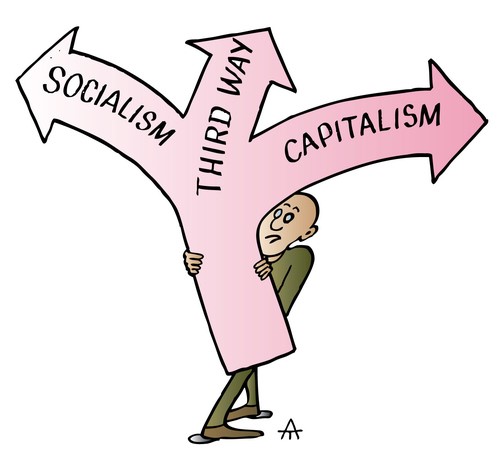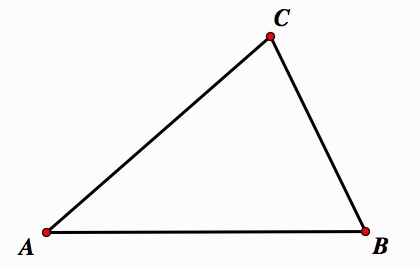Not long after I first heard about TRIZ, I heard the expression ‘Third Way’ politics. Putting two and two together to make five, I naively assumed that this meant a version of politics in which contradictions got solved rather than have everyone disappearing in ever diminishing circles of either/or Socratic nonsense. I didn’t know it at the time, but the expression had been around for close to a hundred years. The Germans thought of it. Then the Italians. Then I heard it from Tony Blair’s New Labour party spin-doctors. Sadly, none of them had heard of TRIZ. Which meant that ‘Third Way’ pretty much ended up meaning ‘middle ground’. Or, worse, corny attempts to cherry-pick the ‘best’ bits of left- and right-wing politics. So we ended up with an ill-fitting hybrid of equality, meritocracy, social justice and ethical capitalism. It was precisely as un-imaginative as it sounds.
The whole non-event didn’t last more than a month. Every time a journalist asked a politician to explain what the Third Way was, all they got back was a stream of ‘err’s’ and meaningless blather. No-one, but especially Tony Blair, seemed to have any idea what they were endorsing.
Of all the forms of human endeavour, politics seems to be the one still living furthest in the past. A couple of thousand years in the past to be precise. Socrates left quite a legacy. He has a lot to answer for.
From a TRIZ perspective, Third Way means something quite different I think. TRIZ tells us to solve the contradiction not manage the trade-off. The ‘Third Way’ is not supposed to be some mediocre mid-point between A and B, it’s supposed to be a place labelled C. A place where the proponents of both A and B are both better off.
One of my favourite metaphors for the political world is ice-cream kiosks on a beach. If there’s only one kiosk, the owner can position it wherever they like. If people want to buy an ice-cream, they have to walk to wherever the kiosk is. If a second kiosk arrives, customers get a choice. At least for a while. The position of the two kiosks quickly stabilises, either with both sitting next to each other in the middle of the beach, or symmetrically positioned either side of the mid-point. It’s only when a third kiosk arrives on the scene that things start to get interesting. Now there is no stable, ‘correct’ position for any of the three kiosks, and so they constantly have to jostle with one another if they want to sell enough ice-creams to stay in business. Three is better than one or two, but it still has nothing to do with Third Way kiosk positioning strategy.
A Third Way ice-cream market would make the ice-cream sellers mobile, so they can come to customers. Or make use of ice-cream delivering drones. Or phone-app ordering systems. Or all of the above.
Whenever we see politicians debating the merits of privatisation versus nationalisation, or centralised versus distributed government, open-versus-controlled borders, austerity-or-invest-in-infrastructure, or any other pendulum-swing debate, the TRIZ version of Third Way politics tells us that all we’re hearing is a lot of pointless Socratic hot air. Hot air that will only ever result in lose-lose solutions that take society into a deeper and deeper downward spiral. (See the article in this month’s SI ezine for a tangible example – http://systematic-innovation.com/current-e-zine.htm.)
Large parts of the world currently seem to be teetering on the edge of a no-way-back precipice. It only needs one random either/or domino to fall over and the whole shebang falls over with it. Socrates day has come. It’s time for a Third Way. A contradiction-solving version of the Third Way. One that has everyone designing trade-off-eliminating breakthrough solutions rather than debating which of the current crappy options are the least crappy.


